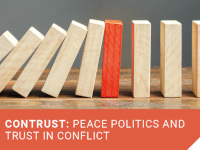Trust is a central but often underestimated resource in international relations. It requires great efforts to build trust among individuals and institutions, but it is difficult to control and easily broken. Trust is an important prerequisite for resolving conflicts and at the same time conflict is a process in which trust can be formed. The war in Ukraine is an example of how trust can be destroyed in a short time, in international relations and in the international order.
The 2022 PRIF Annual Conference "ConTrust: Trust in Conflict – Peace Politics under Conditions of Uncertainty" will debate and analyze the topic of trust and its relation with peace politics from a multitude of perspectives. The conference will explore questions of what enables the building and solidification of trust between different actors and in institutions, and how trust and conflict relate to each other.
Based on the project "ConTrust", a joint research initiative between PRIF and Goethe University, it will be argued that even in constellations of conflict, certain conditions can enable trust to be built. The concept will be examined not only with a focus on different regional perspectives, but also with a view towards the role of (international) organizations and the important part trust plays in arms control settings.
When: Wednesday, March 23, 2022. 11:00 am – 07:15 pm
Where: Online
To register for the livestream, please send an e-mail to annualconference@hsfk.de.
Program
Please find the program for PRIF's Annual Conference 2022 below. You may also download a PDF version.
11:00 | Arrival / Welcome
11:15 – 12:45 | Arms Control Between Trust and Verification
Chair: Christopher Daase
- Trusting Science. The Discourse on Technical Expertise and the Chemical Weapons Convention (Una Jakob / Christopher Daase)
- Trusting Experts. The Role of Groups of Governmental Experts (GGE) in Arms Control (Anna Ferl)
- Trusting Artificial Intelligence. AI and New Ways of Verification of Arms Control (Niklas Schörnig)
- Trusting Your Neighbor. Social Preconditions for the Control of Small Arms and Light Weapons (Simone Wisotzki)
- Discussant: Maria Rost Rublee
12:45 – 13:30 | Lunch Break
13:30 – 15:00 | Dealing with Crises: How International Institutions Enable or Disable Trust
Chair: Nicole Deitelhoff
- Establishing Trust and Distrust When States Leave International Organizations (Ben Christian / Dirk Peters)
- Trust, Mistrust and Distrust and its Effects on Cooperation between Civil Society and International Economic Organizations (Melanie Coni-Zimmer / Diane Schumann)
- Enabling Trust - IHFFC Activities Other Than Formal Inquiries (Thilo Marauhn)
- Discussant: Bernhard Zangl
15:00 – 15:15 | Coffee Break
15:15 – 16:45 | Temporal Dynamics of Trust in Conflict
Chairs: Hanna Pfeifer and Irene Weipert-Fenner
- Inter-Elite Trust Before and After Revolution in Tunisia (Jasmin Lorch)
- Social Trust in Syria Before and After Civil War (Abdalhadi Alijla)
- Political and Social Trust in the MENA Over Time (Niels Spierings)
- Temporality and Dynamics of Trust in Conflict: Illustrations From the MENA (Irene Weipert-Fenner / Hanna Pfeifer)
- Discussant: Jonas Wolff
16:45 – 17:00 | Coffee Break
17:00 – 18:30 | Trust in Institutions, Coronavirus Deniers, and the Far Right
Chairs: Julian Junk and Daniel Mullis
- Alternative News and the Infodemic - Erroding Trust and Fueling Anger during the COVID-19 Crisis (Lena Frischlich)
- Belief in COVID-19 Related Conspiracy Myths and Support for Containment-Measures (Jonas Rees / Andreas Zick)
- Covid19 and the Far Right: A Case Study From Saxony, Germany (Daniel Mullis / Paul Zschocke)
- Discussant: Charlotte Heath-Kelly
18:30 – 19:00 | Closing Panel on the War in Ukraine
Discussion between Tanja Börzel and Nicole Deitelhoff, moderated by Stefan Kroll
19:15 | Reception
